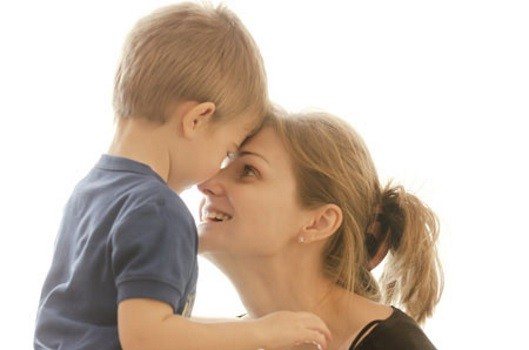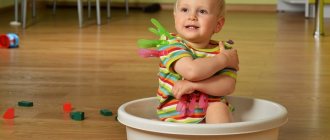- Preschool crisis/7-year-old crisis
Between 7 and 8 years old, children enter a new stage in their lives: they begin to attend school. The new period causes anxiety and doubts in many parents: how to properly help their son or daughter adapt to a new environment, develop him, and strengthen the child’s health. Let's take a detailed look at the changes occurring with the child during this period, and study the important aspects of the upbringing and development of children at 7-8 years old.
Physiological development
At 7-8 years old, the child’s body is actively forming and developing. The processes of improving the musculoskeletal, cardiovascular, pulmonary, and immune systems are taking place, the joint-ligamentous apparatus and muscles are developing. The bodies of boys and girls are rapidly approaching adult proportions.
The growth spurt that began several years ago is gradually fading away. By the age of 8, most children will have grown 3-4 cm per year until the onset of adolescence (10-12 years).
Physiological changes in a child’s body at 7-8 years old
At 7-8 years old, changes occur in different systems and organs of the child’s body:
- The active development of the musculoskeletal system continues: increased growth of arms and legs due to an increase in tubular bones, lengthening of the spine, expansion of the sternum. The bones in the body change in shape and structure, and the process of ossification continues. The ongoing processes in the musculoskeletal system require parents to carefully monitor the child’s nutrition, adherence to the daily routine ,
offer their son or daughter a sufficient amount of physical activity (the child should walk outside at least 1.5 hours a day); - There is an active development of small muscles of the hands, ossification of the phalanges of the thumb and index fingers. This process is enhanced by the additional stress on the fingers while learning to write at school. Many children aged 7-8 years often complain of tired arm muscles and wrist pain. This is fine. Several months will pass and the hand will adapt to intense loads, the discomfort will disappear;
- increase in the volume of large muscles. The child's body begins to acquire curves like that of an adult. There is active development of the muscles of the legs, arms, chest and back. The baby becomes resilient, can cover several kilometers on foot, can easily support the weight of his own body, hang on a crossbar, and can pull himself up;
- There is a transition from the abdominal type of breathing to the chest or mixed type. At the age of 7-8, girls completely switch to chest breathing; boys use both types alternately depending on the load. This happens thanks to strengthening the muscles of the back and chest, which help the lungs open in all directions, pushing the ribs apart;
- The development and strengthening of the diaphragm is completed. Playing an important role in the respiratory function of the body, the diaphragm is the limiting barrier between the organs located in the chest and abdominal cavity. By 7-8 years the diaphragm is fully mature;
- Completion of lung formation. By the age of 7-8 years, in most children, the lungs reach their maximum volume, all the main alveoli and alveolar ducts are formed. Some changes will occur before age 12, but most pulmonary development will be completed by age 8;
- Development and strengthening of the cardiovascular system. Along with the active growth of the body and internal organs, changes also occur in the child’s circulatory system. Babies who grow quickly enough experience discomfort in the heart area. Most often this is caused by a rapid growth rate of the heart and some lag in the development of blood vessels. This imbalance will disappear by adolescence (12-14 years);
- Restructuring of immunity. If previously the thymus gland played the main role in protecting the body from viruses and bacteria, then at the age of 7-8 years the lymph nodes, tonsils, bone marrow, and spleen are gradually included in this process;
- The process of replacing baby teeth with molars. For some children, their first milk teeth began to fall out at the age of 6, and by the age of 7-8 years, the first molars grew in their place. Between 7-8 years of age, most children will lose not only their front teeth, but also some of their side teeth. Normally, the process of replacing baby teeth will be completed by age 12.
These changes in the body are only the most obvious processes occurring in the child’s body. In fact, every day the baby grows and changes, the body is slowly preparing to become an adult, strong, developed.
Things to remember:
- About posture. Try to remind your son or daughter every day how to sit at the table correctly and maintain the correct body position. Pay attention to the desk where the baby is sitting. While writing, his knees and elbows should be at an angle of 90 degrees, and there should be a right angle between his back and legs. It’s good if the desk top is slightly inclined. Once every quarter, check whether the desk is suitable for your child, whether you need to offer him a higher chair or raise the tabletop. Make the same demands for your child’s work place at home;
- About the fingers. Offer your child various activities to develop fine motor skills, teach him to do hand exercises. Such activities will help you quickly get used to the load on your hands while writing and will reduce finger fatigue;
- About physical activity. At school, the child spends most of his time in a sitting position. After classes, he needs sufficient load on all the muscles of the body. Encourage your child to play outside every day for 1.5 hours, if possible and willing, send them to a sports section of your son or daughter’s choice;
- About the daily routine. To fully restore the body, the child must sleep 10-11 hours a day, of which 1 hour is a daytime nap;
- About maintaining hygiene. At 7-8 years old, many changes occur in a child’s life; he adapts to a new daily routine and loads. At first, a son or daughter may become confused and begin to forget about the need to follow hygiene rules. Try to remind your baby of the importance of following these rules and unobtrusively monitor their implementation.
Every day the baby grows and changes, the body slowly prepares to become an adult
Norms of basic indicators for children 7-8 years old:
Pulse - 85 - 100 beats per minute;
Blood pressure - 100/60;
Hemoglobin - 115 - 150 g/l;
ESR - 4 - 8 mm/h.
Height and weight
| Lower growth limit | Upper growth limit | Lower weight limit | Upper weight limit | |
| Boy 7 years old | 111 cm | 130 cm | 18 kg | 30 kg |
| Boy 8 years old | 116 cm | 137 cm | 20 kg | 36 kg |
| Girl 7 years old | 111 cm | 131 cm | 18 kg | 32 kg |
| Girl 8 years old | 116 cm | 137 cm | 20 kg | 37 kg |
A girl, 7 years old, is overweight
Good day, Natalia.
It’s very good that you paid attention to the girl’s excess weight and are concerned about the possible negative consequences for emotional and physical health. So you have already taken the first step towards solving the problem - you have identified that it exists. With children, this is very important, because young children cannot critically assess their condition. You have already determined that this is not an endocrinological problem.
Which one?
1. Dietetic. From the point of view of a nutritionist, any weight gain is an excess of incoming kilocalories over their expenditure. Therefore, the answer here is clear - reducing calories and increasing energy expenditure. With children it’s easy – sports training 3 to 6 times a week.
2. Psychosomatic. Excess weight and obesity are psychosomatic problems; a person “eats stress, negative emotions, anxiety.” On the one hand, the treatment of psychosomatic problems in psychotherapy is the most developed, but on the other hand, it is the most difficult. Because to express discomfort, it is not emotional abilities that are used, but physiological ones.
If we look at the scale of expression of emotions, we will see four levels for the expression and awareness of discomfort: verbal, emotional, behavioral, somatic. The somatic level, or when the body reacts at the most ancient and primitive level. For example, a baby cannot say that he is irritated, and he breaks out in irritation and diathesis.
3. Family. “Look for a child’s problems in the parents’ restrictions” - any child psychologist knows this aphorism. If you want to transform a child’s behavior, then find and transform limiting beliefs in the family of origin.
What to do? 1. Get diagnosed by a nutritionist and follow his instructions for 2-3 months. If the symptom does not go away, then: 2. Do a good psychodiagnosis, since you have already done an endocrinological diagnosis. As a result of psychodiagnostics, it is possible to identify the level of functioning of the child, family, family parenting styles and therapeutic goals.
My experience: Usually, children's chronic problems (and a problem is considered chronic if it lasts more than 6 months) are treated productively only with combination therapy: Nutritionist, Physical education, Family psychotherapy and child psychodrama.
Keep in mind that childhood problems should be multiplied by a factor of 10. 1.5-2 years before age 10 is the same as 15-20 years after age 30. The sooner you seek a consultation, the faster your recovery will come.
Best regards, Marchenko Victor.
Physical development
At 7-8 years old, a child should have the following physical skills:
- Run. The child must be able to run slowly, with acceleration, quickly, changing the speed of movement. Be able to run fast for short distances, slowly for long distances (500m). Boys and girls must master the skill of running with high knees, on tiptoes, with long strides, and bouncing. While moving, be able to jump over small obstacles without slowing down, change the direction of movement without slowing down;
- Jumping. Be able to jump on 1 and 2 legs forward, up, to the sides, over small obstacles;
- Climb. Be able to climb up and down stairs, rainbows, ropes, rope ladders;
- Hanging on your hands. Hanging on the bar, be able to tear off one hand and hang on the other for several minutes, return the hand to its previous position. Hanging on the horizontal bar, raise your body to at least half the length of your arm so that your shoulder and forearm are in a position of 90 degrees relative to each other;
- Crawl. If necessary, crawl on all fours, on your bellies under an object or a stretched rope;
- Lean forward, to the sides. During the forward bend exercise, reach with your fingers to the floor;
- Squat. Perform a squat without lifting your heels from the floor, keeping your back straight, and do not lose your balance during the exercise;
- Ride a bicycle, roller skate, skate;
- Games of badminton, table tennis, ball.
Mental development
At the age of 7-8, changes in the qualitative perception of reality gradually appear in the child’s psyche, and a clear boundary between the fictional and real world is formed.
When a child enters school, a new adult appears in his life who influences the formation of his personality—the teacher. A new stage begins in understanding what has been previously studied. Critical thinking appears .
Most often, children really trust all the words spoken by teachers. If they disagree with what their parents say, their critical attitude towards everything that others say intensifies.
Between 7 and 8 years of life, new qualities are formed in a child. Thanks to daily communication with peers in new conditions (rules of behavior at school), children begin to learn patience and teamwork. This is especially noticeable in a home environment. The child often asks adults to help him complete this or that task, and he himself expresses a desire to help his parents.
Unfortunately, not for all children the beginning of school life is associated with rapid adaptation to new conditions. If you notice that your child has become withdrawn, does not want to talk about events happening at school, or has a negative attitude toward learning, you need to pay attention to his relationships with the teacher and classmates. Perhaps the baby lacks communication skills and needs to be told how to communicate with other children, or he exhibits certain complexes related to appearance or skills. To overcome complexes, you need to try to engage the baby in some activity (sports, clubs) and work on developing social skills (show how to make friends, communicate, express emotions of empathy, support).
Difficulties in a child’s adaptation to school should not be ignored. If you cannot help your son or daughter on your own, do not hesitate to contact a psychologist. It will help you find the cause of withdrawal and resolve issues of negative attitudes towards learning.
At 7-8 years of age, changes occur in both cognitive and intellectual skills. The most striking of them:
- interest in new, unknown words. The baby not only tries to repeat them, but also to understand their meaning. It is good to teach how to use an explanatory dictionary, to introduce them to finding the necessary information using encyclopedias;
- sound perception improves. A child can easily distinguish different sounds by ear and find differences in two identical words. To train this skill, it is good to suggest playing various word games “Cities”, “Word with the letter …”, etc.;
- long-term memory improves. The child begins to remember not only what he sees, but also what he hears for a long period. If earlier, in order to remember information well, the child needed to see a clear example, now it is often enough to simply imagine a situation or object;
- analytical skills appear. Boys and girls 7-8 years old can successfully comprehend the proposed task, analyze the problem, and come to a conclusion based on their own knowledge. Of course, this is not yet adult logic and reasoning, but the first attempts to analyze are very important for the development of critical thinking;
- children begin to engage in learning activities purposefully. Now a son or daughter can perform even tasks that are uninteresting to them, without being distracted by other activities. This skill needs to be stimulated. While doing homework, help your child prepare his/her work area. It is necessary to remove all toys and distracting objects, create a quiet atmosphere in the apartment;
- contextual speech appears. At 7-8 years old, the child begins to use speech not only as the main method of communication, but also for internal dialogue. To develop this skill, you need to teach your toddler to solve various problems, verbally discussing the conditions and progress of the solution. The ability to correctly construct the process of solving a problem out loud is a step towards quickly mastering the material. Don’t worry, as soon as your baby learns to quickly solve tasks out loud, he will gradually move away from this method and begin to use internal dialogue;
- development of meaningful perception. To study, the child uses observation, search, and examination in order to compare the subject being studied with his knowledge about other things. The ability to concentrate on one task improves, the child can perform one task for 25-30 minutes;
- attentiveness increases. At 7-8 years old, a child can easily solve various puzzles and problems, find small differences and similarities between objects. It is recommended to further stimulate this skill by offering to solve oral problems, purchasing and offering to study with specialized magazines and books on the development of logic;
- imaginative thinking appears. The child can not only remember the name of the object, but also imagine it. In his imagination, a child can create entire experiments and solve complex problems.
Of course, such strong changes in a child’s psyche cannot but affect his behavior and perception of life. Almost all children aged 7-8 years are subject to a crisis of preschool age or a crisis of 7 years.

Preschool crisis/7 year crisis
Preschool crisis/7 year crisis
The beginning of this period usually occurs during active preparation for school. Children who started attending school at the age of 6 encounter it a little earlier, children who started school at 7 - a little later. The origins of this crisis lie in the approach of important changes in the child’s life. The child begins to realize his place in social relationships, and a social role is added to the already existing inner self. Feeling the approaching changes, he reevaluates his position and begins to try to conform to his understanding of adult behavior.
The main signs of the 7-year crisis:
- Increased antics, an attempt to copy the behavior of adults in an excessive manner. Boys may try to copy their dad’s behavior: come and sit with a newspaper in front of the TV, address their mom with specific words, express their thoughts in a distinctly adult manner;
- Stiff behavior, an overly mature attitude towards things and actions. At 7-8 years old, the baby is still a child, but he wants to seem like an adult, so he begins to sharply deny everything that seems childish to him, trying to live like an adult;
- The appearance of unreasonable whims;
- Conflict and negativism. During this period, some children begin to argue with adults, trying to put forward their own arguments, emphasizing their independence.
How to overcome the preschool crisis:
- Patience. There is no need to shout or argue with your child. If you do not agree with his opinion, then try to calmly convince him by providing him with clear arguments;
- Don't force him to play or be a child. Show your little one all sides of adult life. If he prefers to be an adult and not play, then invite him to do an adult activity: clean the apartment, help you do the laundry, cook dinner, etc. This will help attract the baby to everyday activities and give him the opportunity to feel like an adult. The desire to play will return after a while;
- Do not react to whims, take them calmly. Try to discuss every manifestation of negativism with your child in a language he understands.
Crisis phenomena usually pass during the first six months and end with the end of the adaptation period at school.

Raising a child at 7 years old
Child education
Issues of raising a child at the age of 7-8 are primarily aimed at developing the necessary qualities for rapid adaptation to society and acquiring important everyday skills.
At 7-8 years old, it is important to develop in a child independence and the ability to take initiative in everyday matters. The development of these qualities usually occurs through the involvement of boys and girls in domestic work. At 7-8 years old, a child can independently wipe dust, sweep, care for pets and flowers, wash his underwear and socks, etc. It’s good if one of the described actions becomes the child’s responsibility, developing a sense of duty and conscientiousness, the child will see that he is useful, more often show a desire to help.
Tell your little one how important it is to be able to help other people, to offer your services in situations where a person may be embarrassed to ask for help. Develop an understanding of other people's emotions, train the ability to show care, empathy, etc.
Separately, you need to pay attention to the ability to analyze your actions, think about possible results before taking an action. At this age, the baby is already able to model the possible consequences of his actions if he is taught to do this.
To teach a child to evaluate his actions, you can use the “method of reasoning.” To do this, an adult, during a dialogue with a child, begins to reason about the child’s proposal or an already completed action: he discusses how the action looks from the son or daughter’s point of view, then tells why it is unacceptable in the parent’s opinion. The essence of the method is to teach the child to analyze not only his own interests, but also the attitude to action of others.
Following you, your baby will learn to think about actions and actions from different angles, first out loud. After the skill becomes habitual, the baby will begin to reason with himself, conduct an “internal dialogue” .
At 7-8 years old, a child may develop problems associated with self-doubt. A child at this age begins to think more often about his own appearance, skills, and abilities. Not all children can correctly assess their potential and begin to withdraw, experience discomfort in communicating with peers, and cannot make friends. To solve this problem, adults need to emphasize the child’s strengths, tell him about his love, and teach him how to properly build relationships with peers.
During this period, visiting various sports sections of the child’s choice has a positive effect on the child’s self-confidence. Any sport uses philosophy, motivation in the training process, and teaches you to overcome your own fears and weaknesses. Classes with an experienced trainer can change the child’s attitude towards his own body and abilities.
If your son or daughter does not want to attend a sports section, you can offer to go to a dance or creative club. The essence of this method is that the child will see his successes, understand that he can do something better than others, and confidence in his abilities will grow. .
When considering raising a 7-8 year old child, it is worth discussing the issue of helping the child with his homework. In the first years of study, it is unlikely that you will be able to avoid constant requests for help with homework. The main condition for this help is to be an adviser, not a performer. To solve a complex task, invite your son or daughter to solve a similar task using an example with you. Explain the invented task in detail, convey to the child the meaning of the actions, and then ask them to repeat it on the assignment from school.
Many parents complain that they cannot understand how to explain a problem to their children at their level and help them understand the solution scheme adopted in a modern school. There are 2 ways here. 1st - carefully study the textbook. Most modern teaching aids contain a clear scheme for solving a problem, after which the child is asked to solve similar exercises. Please pay attention to what is stated in the example. The second way is to turn to the knowledge of your son or daughter. Ask how the teacher explained the topic to him in class, what method of solution she used.
Let's sum it up
If a child was born sensitive enough, then he will obey only in a familiar and not frightening environment. Such children are more comfortable at home with their favorite toys, and a regular trip to the store can cause them stress and inappropriate behavior. Such a child does not obey because of fear, and in order to calm him down, this fear must be eliminated.
And most importantly, do not think that if a child is small, he can be tricked or tricked into doing what is needed. Even the smallest (and even more so six-year-old) children are acutely aware of the moments when they are being manipulated. And in return they will behave the same way. The main thing in education is to be honest and try to come to an agreement even with the smallest family members. This may require a lot of patience and time from adults, but the result will be impressive - a well-mannered child.
Tags:Hysteria
We also recommend reading on this topic:
- What is the psychology of a 5-year-old boy and what should his upbringing be like?
- Features of the treatment of hyperactivity in preschool children
- How to teach a small child to talk?
- What causes aggressive behavior in preschool children
2 comments
- Eva I was certainly struck by the phrase about the fact that at an early age it was necessary to punish and ignore tantrums... this is terribly unprofessional for psychologists. Where will you put your neuroses after such actions?
Answer
- Light Have you already manifested yourself?
Answer
Differences in the development of boys and girls
Between 7-8 years of life, differences between children of different sexes begin to increase. There are more features in behavior, speech, perception of criticism and information. The foundations of a future character are already beginning to be laid, the foundations of relationships with the opposite sex are being formed. In elementary school, it is very important for a child to have contact with a parent of the same gender.
Boys need to be shown how a man should behave, teach him to do a man’s work to the best of his ability, and develop a respectful attitude towards girls.
It is important for babies to communicate with their mother, to be involved in everyday tasks that their mother performs, and to develop a respectful attitude towards boys.
At the age of 7-8 it is clearly visible that boys and girls are different “planets”. The features and characteristics characteristic of a particular gender are becoming more and more visible:
- Speech. Boys structure their speech using action verbs, prefer simple, clear sentences, and rarely refer to emotions and relationships. For future men, it is important to understand how this or that object works, what actions will follow after the act is committed. Girls are the opposite. Their speech contains more adjectives and emotionally charged words. Often, future women construct complex sentences, trying to convey their emotions and feelings about what is happening;
- Games, toys. Boys more often choose games and activities related to physical activity (outdoor games) or technical study of the world around them (constructors, experiment kits, various equipment). Girls are more prone to quiet games in small groups. In their games, little girls often try to replay events and feel the emotions of the characters;
- Perception of criticism. There is no point in scolding or lecturing the boy for a long time. A man’s brain is not able to withstand long-term emotional stress and very quickly ceases to perceive emotional speech addressed to him. To explain to a boy where he is wrong, you need to use simple short phrases that clearly indicate the wrong action, avoid appealing to the child’s emotions, and do not try to evoke emotions in the future man. It's the opposite with girls. In order for the baby to evaluate her action correctly, you need to show her the whole range of emotions that were caused by her action, tell her where she was wrong. Bright phrases filled with adjectives, even epithets, will help the girl better understand the essence of criticism.
- Emotionality, openness. Boys at the age of 7-8 often become secretive and stop openly discussing their feelings and emotions with their parents. Most often this is due to growing up and the influence of peers on attitudes towards confidential conversations with mom or dad. At this age, you should tell your little one that there is nothing wrong with being frank with loved ones, but if peers laugh at it, you can simply not tell your friends about confidential conversations with mom or dad. Girls are the complete opposite in matters of emotional relationships with their parents; it is important for them to have the opportunity to discuss important issues and internal experiences with their mother or grandmother. The only condition for maintaining such a relationship with your daughter is to take her thoughts, phrases, and emotions seriously. Never laugh at your daughter’s experiences and she will strive to discuss her inner world with you.
How to develop a child at 7-8 years old
It is recommended to build the development of a child in the 8th year of life in 4 areas:
- Physical development. Includes daily exercises, a walk outside, and a visit to the sports section. Ideally, you can organize family events related to physical activity (biking, skiing, forest walks, family sports competitions, joint games);
- Intellectual development. Invite your child to solve various puzzles, crosswords, read encyclopedias, stories together, discussing the plot, interesting events and objects, conduct experiments at home, introduce the secrets of cooking, etc. The development of a child’s intellect is influenced not only by the knowledge he receives at school, but also experience, knowledge about everyday objects, interesting events.
- Aesthetic development. Museums, theaters, circuses, exhibitions, etc. At 7-8 years old, it is important to develop in a child a love of beauty, show him the beauty of paintings and sculptures, introduce him to the theater, opera, ballet, and instill the desire to explore his inner world through contact with art .
- Emotional development. At 7-8 years old, a child can already distinguish many emotions well, but cannot always correctly understand irony, sarcasm, and hidden feelings. Teach your son and daughter to see the difference between different emotions, look at any situation from different points of view, and find the “right” course of action. Children's films, cartoons, and books will help you with this, where, using the example of the main characters, you can analyze many similar situations from the life of a child.
A child of 7-8 years old is a small person who is able to delve into almost all the intricacies of relationships, can draw his own conclusions, and be critical of events. During this period, it is important to gradually get used to the idea that your son or daughter is growing up, taking small steps closer to understanding the world around them from the point of view of an adult.
Normal discharge in girls of different ages
Sometimes parents notice vaginal secretions during the newborn period. Don’t worry, but figure out what is considered normal discharge and when you need to visit a pediatric gynecologist.

Serious conversations
Up to one year old
In a 6-month-old girl, discharge is the result of the activity of the reproductive system and the cleansing of the vagina from pathological microorganisms. Normally, clear mucus with thread-like elements is secreted.
1-2 years
Starting at the age of 1 month, a girl’s sexual development begins a period of rest. Sex hormones are present in minimal quantities, the cervical glands do not function, so nothing should be released during this period. The duration of this period continues until the age of 8 years, when a new stage arrives - the prepubertal period, and the restructuring of the body begins under the influence of hormones. A year before menstruation, the girl has physiological discharge.
A child is 5-6 years old
The reproductive system is not functioning now, so a girl 2-6 years old should not have any discharge. At this time, vaginal diseases often occur, for which there are reasons:
- Immature immune system.
- Anatomical features of the body.
Therefore, orange discharge in 4- and 5-year-old girls indicates an inflammatory process.
Girl 7-8 years old
After a long pause of 7 years, the next stage of sexual development begins - puberty, and leucorrhoea is released again. This is explained by hormonal changes in the body, which prepares the body for the menstrual cycle.
Such discharge has a viscous mucous structure and does not smell.

See an endocrine system specialist











